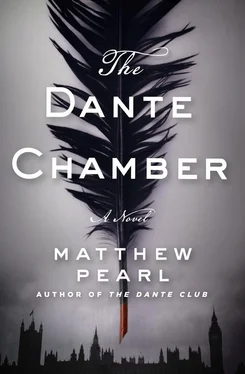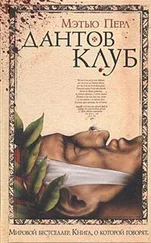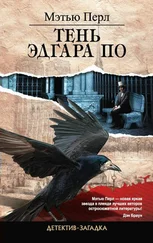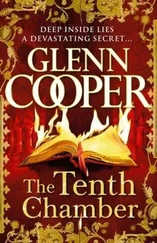Browning set down his glass on the table and resumed pacing the room. He had only taken up port after living in Italy. Having so much wine in Italy had soured him on drinking it. Around him, all across the study, were books inherited from his father, who spent his life trying to make up for the fact that he worked in a bank, as well as remnants of the Brownings’ life in Florence, including a portrait of Dante Alighieri. That portrait! That portrait in which Dante was missing one eye. That portrait, tainted with so many strange meanings.
During the fourteen years they lived in Florence, the Brownings’ careers as English poets paradoxically flourished — the power of exile, it seemed. When Wordsworth died, both Brownings were said to be considered for the poet laureate position before it was awarded to Tennyson. Ba had laughed at the prospect for herself, but Browning wanted it for her more than he’d ever admit. He would have renounced all his ambition and would have destroyed every line he wrote, if by doing so she received the fame and honor she deserved.
It was in Italy where Ba got caught up in the craze of spiritualism. “My poor husband will make no profession of faith till he has the testimony of his own senses,” she would say with a ringing laugh to her new friends before Browning had a chance to voice his skepticism about raising ghosts for the purpose of conversing with them.
How different it was than just a generation before. There were so many styles of worship in so many different churches now, so many sets and sects and subsets and subsects of religions, so many foreigners from other lands with other, peculiar beliefs; there were atheists and new secularists. Nobody knew what they were supposed to believe or what neighbors and relatives believed. Ghosts suddenly became as legitimate an option as anyone’s god.
The gravest offender among Ba’s spiritual advisors in Italy had to be old Seymour Kirkup, who moved to Italy thirty years earlier. The narrow angles of his face suggested aristocratic heritage, but the Englishman’s eyes were wild and raw. In an Italian church, he had discovered a lost portrait of Dante in profile, a fragment of a fresco by Giotto that had been painted over. Kirkup, who fancied himself an artist, traced the portrait. (Dante’s eye had been obliterated by a nail.) The discovery of the portrait, and the distribution of Kirkup’s own copies, brought him acclaim from the artistic and literary worlds. But Kirkup was not content with resurrecting Dante’s noble, war-wearied profile. He claimed to carry out regular and friendly communications with Dante’s ghost.
Kirkup married the daughter of his maid, and proudly announced to the visiting Brownings that when his bride happened to be “in tune,” she possessed great spiritual abilities.
The girl, who looked younger than the seventeen years of age Kirkup claimed, sank into a kind of trance during which, in a high-pitched Italian, she spoke as Dante. First, she — or Ghost Dante — said that Alighieri should henceforth be spelled with two l ’s: Allighieri. With that settled after hundreds of years, Kirkup quizzed the ghost about Beatrice. He asked whether Beatrice was a real Florentine lady. No , said Ghost Dante in the grating voice of the maid’s daughter. Who was she, then? Era un’idea della mia testa , came the reply. An idea of my mind.
It made Browning burn to see the delight on Ba’s face at the charade of supposed ghostly séances. What was it that made this brilliant woman and poet he loved so wholly believe fabrications and utter frauds? Their disagreements on this topic became arguments. Somehow his refusal to think ghosts were anxiously waiting to speak to them or to rap on tables became coupled with his distaste for cigars. “It would do you good to smoke occasionally, too,” she snapped, before citing Tennyson and his ever-present pipe. “Well, if the great Tennyson does it ... ,” Browning would retort. Tennyson knows all, Tennyson sees all, every woman would rather marry the all-knowing, all-seeing, queen-beloved Tennyson! Those arguments — arguments over nothing — haunted him after her death, genuine haunting of a sort he was sure none of those spiritual mediums could recognize.
His blood would cool; he would tearfully apologize. “I love you, Ba, because I love you.” He’d celebrate their wedding on the twelfth of every month, which would always catch her by complete surprise. She never knew the date.
After her death, Browning tried remaining in Casa Guidi, their home in Florence. He appeared solid enough, keeping in one place like a worm-eaten piece of old furniture. But when he tried to move, to do anything, he went to pieces. He remembered, around that time, being in a plaza and catching sight of Tennyson, who was traveling in Italy with his wife and boys; Browning ducked out of sight — he could not tolerate having to greet the perfect family and the perfectly rich and successful poet. Browning pulled his hat down to hide his face, though it was not necessary since Tennyson couldn’t see an inch away from his nose.
Kirkup kept calling on Browning and bothering him about taking a copy of the rediscovered Dante portrait. Since Browning never wanted to see Kirkup again as long as he lived, he agreed to purchase one, in hopes the old ghost-wrangler would have one less reason to harangue him.
When Browning returned to London, his friends dutifully called on him. Gabriel was the first at his doorstep and the only one who didn’t try to cheer him. He just sat with him. Talk turned to religious balms for grief. “I have a knowledge of a God within me,” Browning said, pointing to his heart and pausing. “I know him, he is here, and it matters little to me what tales anyone tells me about him; I smile, because I know him.” Gabriel chewed on his lower lip, then in his deep, velvety voice said, “I lack only a confessor to give me absolution for all my sins.” It was the first time Browning had laughed since Ba died. He laughed until he felt sore, then cried.
He didn’t have to put on a performance with Gabriel, but Browning did his best to reassure most visitors. Days, weeks, years could go by. He could continue on, he could grow old. But he could not feel he’d ever take root in life again any more than, at his age, he could think of learning a new dance step. In a few short years, Pen would be a full-fledged adult, and Browning couldn’t think what he would do with his own idleness then.
There were bleak times. Christmas. New Year’s. Birthdays (his, Hers, Pen’s). Those times he wasn’t so sure he wanted to grow old without Her. He’d try to pray, but he, too, had been raised with an ineffective jumble of spiritual influences. He had no particular church allegiance. He tried out atheism and vegetarianism, though neither suited him; he enjoyed the family lore that he had a Jewish ancestor. He always came back to the belief that creeds, religious and otherwise, were for those who did not have sufficient internal moral guidance.
The magazine writers, when faced with a blank column and nothing to write about, sometimes took to criticizing Browning’s new life in London. He spent his time in gilded salons, they would sniff, of the great and wealthy, snobbish like his poetry. He was fond of expensive Scotch. (He hated it, but the writers had mistaken his port for it.) He liked to be among refined people who appreciated him. Very well. But what did any of it have to do with poetry? Besides, mixing with society and the friction of ideas were necessary things to a writer. These were the arguments Browning would make to himself or to sympathetic companions. He would never say — hardly ever let himself think , really — how he needed society for a more pressing reason, to avoid the emptiness that existed without Her.
Читать дальше












